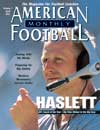AMERICAN FOOTBALL MONTHLY THE #1 RESOURCE FOR FOOTBALL COACHES
Article CategoriesAFM Magazine
|
Keeping the Gators on topUF Athletic Director Jeremy Foley gives Steve Spurrier room to excelby: Rod Smith © More from this issue University of Florida Athletic Director Jeremy Foley sits atop an athletic program that has consistently ranked among the nation's 10 best. Since 1992, when he assumed the reins of the Gator athletic department, continuing that legacy of excellence has been one of his top goals. Named an honorary alumnus by the Florida Alumni Association in October, Foley, 47, started his career at UF as an intern in the Gator ticket office in 1976. Since then he has worked in nearly every aspect of the Gator athletic program. Under Foley, the Gator's athletic program has ranked among the top five for 10 of the last 11 years, according to national all-sport rankings. Meanwhile, Foley has been the driving force behind more than $77.5 million worth of construction projects including two major expansions of the 83,000-seat Ben Hill Griffin Stadium....The full article can only be seen by subscribers.
|
|
|||||||
| HOME |
MAGAZINE |
SUBSCRIBE | ONLINE COLUMNISTS | COACHING VIDEOS |
Copyright 2025, AmericanFootballMonthly.com
All Rights Reserved





